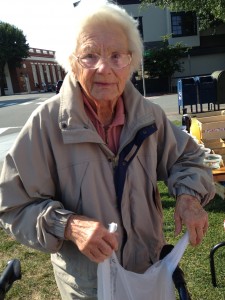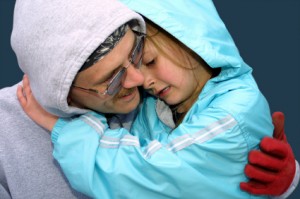|
|
May 14, 2014
 Let me try to make it better Unless this is your first visit here, you know I’m all about teaching kids to be good people. What form of “goodness” am I after? Who cares? Good is good. Let’s not quibble.
If I had to choose one flavor of goodness over another, however, I’d say I’m partial to the kind that connects us to the suffering of others with a grip so powerful that we simply cannot resist the temptation to do something to try to make the other guy feel better. This is compassion. Not complicated and yet, in many homes, schools, city streets, compassion seems to be MIA. Why is that? I’ve got a theory. (Unless this is your first visit, you also know I’m very generous with my theories.)
OK, here’s how it works: Within me (and each of you) is a vat overflowing with opinions, assumptions, fears and all the rest of what I secretly stockpile and use to avoid doing the right thing, which is often a scary thing but at the same time, a good thing. Submerged under the fearsome muck lies a luminous pearl. When you pull the plug and let the bubbling crude drain out of the vat, (which just takes an instant because the conscious act of pulling the plug awakens you to the fact that while your inventory is er… interesting, it’s not really you at all) the pearl emerges and vaporizes your resistance to acting compassionately. Which is a helluva lot more helpful than sitting on your butt and simply feeling compassionate.
Speaking of compassionate acts, I’m reading Glennon Melton’s book Carry on, Warrior. (Great writing. Great book. Read it!) When I came to this part in which Glennon writes a letter to her son preparing him for the social garbage he might encounter in 3rd grade, I stopped and smiled. See if it doesn’t have the same effect on you:
“Compassion might lead you to tell a teaser to stop it and then ask the teased kid to play. You might invite a left-out kid to sit next to you at lunch. You might choose a kid for your team first who usually gets chosen last. These things will be hard to do, but you can do hard things.”
Yep. We can do hard things that help each other. Lucky we have this ability because this trip we’re all on is hard. If it was easy (were easy… thank you, Mom) they’d call it a Day at the Beach. Instead they call it LIFE. So keep your hand on the plug and apply compassion as needed.

December 13, 2013
 We’re here to help, not judge Man, it’s been beyond chilly in California. (Mid-westerners, no snide chuckles, please. I don’t care what your definition of winter is, 23 degrees is cold.) But still, I’m into this. I love watching the dogs romping in the 5 pm sunset over at the park. I love making soup and lighting candles in my living room now packed with plants wintering inside. I love how business meetings get pushed off til January and that most people are down-shifting to a family-oriented gear. With our first grandchild on the way, I’m thinking more about the chain of love, life and the power we have, generation to generation… to teach kids to be kind, compassionate and open-minded. To help you do that, here’s an excerpt from my parenting book, Teaching Kids to Be Good People.
We assume we know so much more about other folks than we actually do. Teaching kids to be good people includes helping them understand how biases get in the way of knowing who people really are, what they need, and how we can help them (because that’s what we’re here for.)
From the We’re on This Speck Together file comes some food for thought from Carl Sagan: “For small creatures such as we, the vastness is bearable only through love.” Think back to middle or high school. What did your peers assume about you that wasn’t true? How do imagine those assumptions affected people’s relationships with you? Think about a former classmate who had a certain “reputation” which led you to have certain assumptions about him/her. How did your assumptions color your behavior toward that person?
• Talk with your child(ren) about the concept of the “judge” within us who rates other people mostly in terms of what we like/admire about them and what we don’t. Discuss how unfair it can feel to be judged, especially when the “judges” don’t really know us.
• Make a pledge to monitor your “judgmental” thoughts more carefully between now and New Year’s Day. Try to catch those critical thoughts before they become words. Each time we let The Judge put someone down, we stack another brick in the wall of misunderstanding. With less judging, we get to know each other better. Let’s teach kids to build bridges, not walls.

February 6, 2013
 "I'm sorry, Daddy. I didn't know." When a very young child intentionally hurts another, how do we respond? With outrage and anger? Threats and intimidation? None of the above. Young children are ignorant, as in, they don’t know any better. Instead of shouting, a caring adult needs to step in and say to the child, “When you do that, you hurt others. When you hurt others you hurt yourself. The next time you feel so upset that you feel like doing harm, come to me. Let’s talk and work together. I can help you learn to handle those big feelings in safer ways, so that you can be a helper, not a hurter.”
When adults treat children in this respectful, compassionate way, children learn to be compassionate. But when adults respond to a child’s ignorance with anger…. how can they possibly learn about compassion?
When older children and adults behave cruelly it’s harder to view their actions through the “ignorance” lens, but it still applies. When we intentionally harm others, we are, in that moment, blindly ignorant of the hurt we cause. If, in that moment of harming, we had known better we would have done better. That’s why, whenever we get our buttons pushed and are about to lose it we need to calm down and wake up just enough to recognize the damage we are contemplating. And in that moment of pause, we realize that we do, indeed, know better.
All teachers are not parents, but all parents are teachers. Teaching kids to be good people includes teaching them how to manage their destructive emotions in constructive ways. When we witness cruelty between kids we need to summon compassion. Through our compassion for their ignorance we can help children become wiser.

| |














